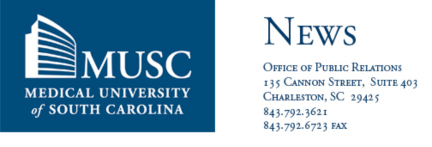
Nov. 30, 2011
CHARLESTON -- Today, parents of 36 children in the U.S. will be told that their child has cancer. Compounding that situation, not all providers have access to cancer-fighting medications due to a drug shortage.
Michelle Hudspeth, M.D. chief of pediatric hematology-oncology and director of the Pediatric Blood and Marrow Transplantation Center at the Medical University of South Carolina (MUSC) Children’s Hospital, testified on that issue Wednesday before the U.S. House Subcommittee on Health Care in Washington, D.C.
Between 2005 and 2010, the number of prescription drug shortages nearly tripled in the U.S. The vast majority of these are generic, used to treat curable childhood cancers such as acute lymphoblastic leukemia, which is curable in almost 90 percent of the cases.
Hudspeth cares for close to 75 newly diagnosed children with cancer every year at MUSC Children’s Hospital.
"Recently, I had to tell the parents of a two-year-old child that their son has high-risk acute lymphoblastic leukemia, one of the most common childhood cancers," Hudspeth said. "But this treatment requires six chemotherapy drugs, five of which are in shortage. Fortunately, we have the drugs available at our hospital right now, but what about next month?"
The major advances in pediatric cancer have occurred through clinical trials, but the shortage will have a significant impact on these studies if the drugs needed are in short supply.
The shortage not only undermines the advancement of cancer treatment, but also carries a large financial impact. Substituting medications is costly, and locating replacement drugs is time consuming and expensive. A recent study reported that the overall personnel costs associated with managing drug shortages costs health systems an estimated $216 million each year. Additional time and effort is spent educating staff about shortages and potential drug substitutions.
"Regrettably, most institutions have had to institute a review board, often with involvement of their institutional ethics committee, to develop harrowing plans of how to ration chemotherapy drugs, most of which are generic drugs that have been around for 30 years or more," said Hudspeth, "How do you decide who should be given the chance to live?"
About MUSC
Founded in 1824 in Charleston, The Medical University of South Carolina is the oldest medical school in the South. Today, MUSC continues the tradition of excellence in education, research, and patient care. MUSC educates and trains more than 3,000 students and residents, and has nearly 11,000 employees, including 1,500 faculty members. As the largest non-federal employer in Charleston, the university and its affiliates have collective annual budgets in excess of $1.7 billion. MUSC operates a 750-bed medical center, which includes a nationally recognized Children's Hospital, the Ashley River Tower (cardiovascular, digestive disease, and surgical oncology), and a leading Institute of Psychiatry. For more information on academic information or clinical services, visit www.musc.edu or www.muschealth.com.
#####